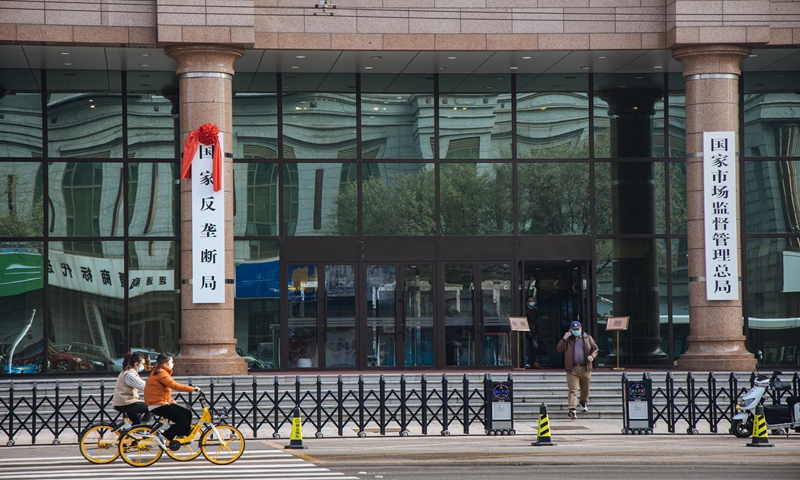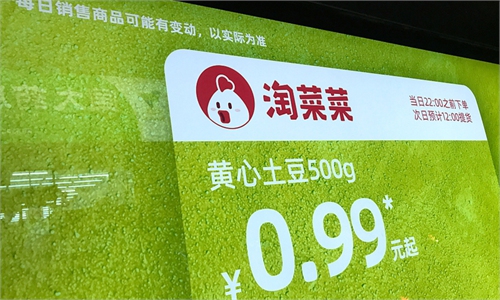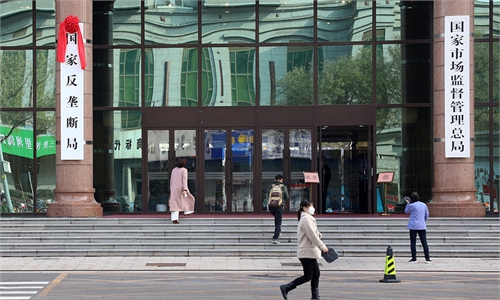
China's anti-monopoly bureau officially launches on November 18, 2021. It's located in the same building as the country's top market regulator, the State Administration of Market Regulation, in Beijing. Photo: Li Hao/GT
Chinese authorities vowed on Thursday to continue strengthening anti-monopoly efforts this year to prevent the disorderly expansion of capital by big platforms with dominant market positions, creating more space for medium-sized, small and micro-sized firms, as well as individual businesses and industries, which constitute the vast majority of China's robust economy.
The number of small individual businesses in China, accounting for two-thirds of the country's market entities, reached a record high in 2021, surpassing the 100 million mark and providing 276 million jobs, data from the State Administration for Market Regulation (SAMR) showed.
As of the end of 2021, the number of China's registered individual businesses and industries reached 103 million. Among them, 90 percent were concentrated in the services industry, mainly in wholesale and retail, accommodation, catering and residential services. Despite the impact of the COVID-19 pandemic over the past two years, their overall development has been stable, Pu Chun, deputy head of the SAMR, told a press conference on Thursday.
In 2021, the ratio of newly established individual businesses against the number of market exits was 100:50, which was basically the same as in recent years, and there was no large-scale market exit, he added.
Lack of stable expectations and development confidence, a labor force that is falling short of market demand and rising in cost, soaring costs of raw materials, logistics and rentals, as well as pressure from platform giants have all added to the difficulties faced by small businesses, according to a SAMR survey.
Small businesses feel squeezed by the digital behemoths as the latter take advantage of capital, data and technology to expand, raising fees and attaching unreasonable transaction conditions, the survey said.
Efforts are underway to help firms cope with these challenges, officials said.
With the amended Anti-monopoly Law set to be launched soon as the core of this effort, China will accelerate the improvement of relevant laws and regulations to crack down on unfair competition, clarify the bottom line of the rules, and provide market players with clear expectations, said Yuan Xilu, an official with the SAMR.
Appropriate "traffic lights" will be set up to guide all kinds of capital and market players to compete in an orderly manner and develop in a standardized way, with anti-monopoly rules focusing on areas such as the platform economy, technological innovation, information security and livelihoods, according to Yuan.
Chen Liang, general manager of Dongguan Jinconn New Material Holdings Co, a private company that makes magnetic materials in Dongguan, South China's Guangdong Province, told the Global Times on Thursday that the firm felt strong support on the national level for small firms during the pandemic, especially the precise support for the "little giant" firms from the Ministry of Industry and Information Technology.
"Little giant" firms refer to small enterprises that are still at the early stage of development and focus on the next generations of information technology, high-end equipment manufacturing, new energy, new materials, biomedicine and other high-end fields.
Jinconn's revenues hit 250 million yuan ($39.4 million) in 2021, up 90 million yuan compared with the previous year.
The monthly index tracking the performance of 3,000 SMEs from eight major sectors gained for the second straight month to 86.4 in December, up from 86.3 in November and 86.1 in October, according to data released by the China Association of Small and Medium Enterprises in early January.
"Despite the improvement, SMEs still face multiple challenges and risks including rising costs and unstable expectations in the first quarter," Ma Bin, executive director of the industrial group, told the Global Times.
"To promote the continuous recovery of SMEs to overcome these hardships, we must continue to implement new tax cuts and fee reductions for market players, and help relieve their burdens and restore development confidence," Ma noted, adding that it is necessary to maintain reasonable and sufficient liquidity to increase financing support for the real economy.




